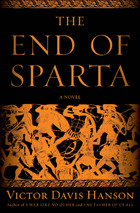 In the past, I have often felt that historians transitioning from academic writing to fiction have difficulty in maintaining the flow of plot over details so beloved in academia. Victor Davis Hanson, previously at the University of California – Fresno and currently Senior Fellow at Stanford’s Hoover Institute, has in my opinion suffered from this same difficulty in his inaugural novel, The End of Sparta. Displaying his wide expertise and depth in Greek historical minutia, it would seem that he has left the general layperson behind in a novel no doubt intended for a wide audience. Although my own knowledge of Greek history, literature and language have increased to maybe the level of a sophomore in Classical Studies due to reading this fictionalization of the Boeotian War, I believe that it would appeal mainly to those who have at least a superficial knowledge of such topics.
In the past, I have often felt that historians transitioning from academic writing to fiction have difficulty in maintaining the flow of plot over details so beloved in academia. Victor Davis Hanson, previously at the University of California – Fresno and currently Senior Fellow at Stanford’s Hoover Institute, has in my opinion suffered from this same difficulty in his inaugural novel, The End of Sparta. Displaying his wide expertise and depth in Greek historical minutia, it would seem that he has left the general layperson behind in a novel no doubt intended for a wide audience. Although my own knowledge of Greek history, literature and language have increased to maybe the level of a sophomore in Classical Studies due to reading this fictionalization of the Boeotian War, I believe that it would appeal mainly to those who have at least a superficial knowledge of such topics.
While reading it would would no doubt stir the interest of the ignorant (as I was) to further research this exciting period in the history of Western civilization, it suffers from a plot whereby at the end of the novel the fate of the main characters become, for me, seemly unimportant. The real strength of the story was at the beginning at the Battle of Leuctra. There, Hanson was able to display his capability as a wordsmith that had brought alive his previous works such as A Western Way of War: Infantry Battle in Ancient Greece and A War Like No Other: How the Athenians and Spartans Fought the Peloponnesian War. We can feel weight of the panoply, the mass at our backs, the dread of death or injury and the crunch of contact as two lines collide through his words. It is only in the story where he falters.
As other reviewers have noted, Hanson is not a writer laying down fiction so much as using fiction to flesh out history. He tries to lay open the mind of the Hellenes on paper, bring ancient motives out to be interpreted by modern readers. As a novel, it is marginal. As history, it is enlightening.
